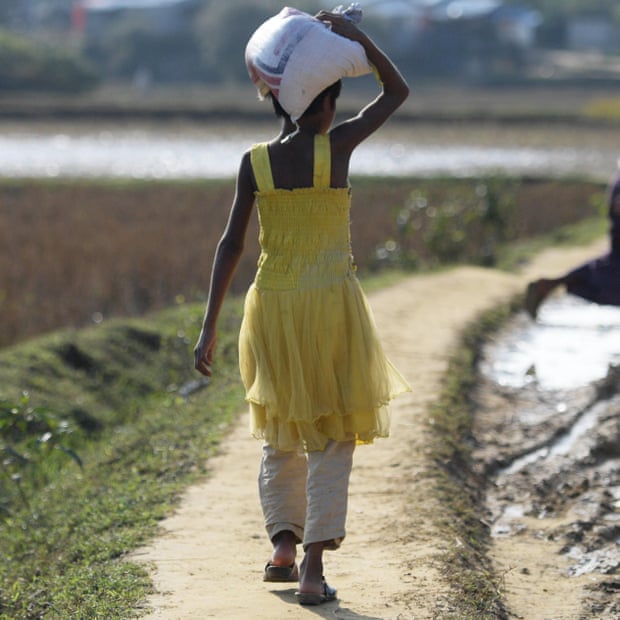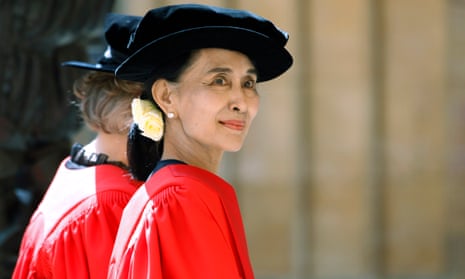Aung San Suu Kyi has been formally stripped of the Freedom of the City of Oxford award over her response to the repression of her country’s Rohingya Muslims.
Oxford city council voted unanimously to permanently remove the honour given to the de facto leader of Myanmar in 1997, and said it did not want to celebrate “those who turn a blind eye to violence”.
Oxford councillors had previously voted to support a cross-party motion to remove the award, and made the decision official in a vote on Monday evening.
The vote comes on the same day Myanmar’s powerful army chief told Pope Francis there is “no religious discrimination” in Myanmar.
Over 600,00 Rohingya Muslims have been driven from Rakhine state in western Myanmar into neighbouring Bangladesh through a series of military operations, which the United Nations has described as a “textbook example of ethnic cleansing”.
Cllr Mary Clarkson (Lab), who proposed the motion, told the BBC: “Oxford has a long tradition of being a diverse and humane city, and our reputation is tarnished by honouring those who turn a blind eye to violence. We hope that today we have added our small voice to others calling for human rights and justice for the Rohingya people.”
Q&AWho are the Rohingya and what happened to them in Myanmar?
Show

Described as the world’s most persecuted people, 1.1 million Rohingya people live in Myanmar. They live predominately in Rakhine state, where they have co-existed uneasily alongside Buddhists for decades.
Rohingya people say they are descendants of Muslims, perhaps Persian and Arab traders, who came to Myanmar generations ago. Unlike the Buddhist community, they speak a language similar to the Bengali dialect of Chittagong in Bangladesh.
The Rohingya are reviled by many in Myanmar as illegal immigrants and suffer from systematic discrimination. The Myanmar government treats them as stateless people, denying them citizenship. Stringent restrictions have been placed on Rohingya people’s freedom of movement, access to medical assistance, education and other basic services.
Violence broke out in northern Rakhine state in August 2017, when militants attacked government forces. In response, security forces supported by Buddhist militia launched a “clearance operation” that ultimately killed at least 1,000 people and forced more than 600,000 to flee their homes. The UN’s top human rights official said the military’s response was "clearly disproportionate” to insurgent attacks and warned that Myanmar’s treatment of its Rohingya minority appears to be a "textbook example” of ethnic cleansing.
When Aung San Suu Kyi rose to power there were high hopes that the Nobel peace prize winner would help heal Myanmar's entrenched ethnic divides. But she has been accused of standing by while violence is committed against the Rohingya.
In 2019, judges at the international criminal court authorised a full-scale investigation into the allegations of mass persecution and crimes against humanity. On 10 December 2019, the international court of justice in The Hague opened a case alleging genocide brought by the Gambia.
In 2012, Suu Kyi was celebrated with an honorary doctorate from Oxford, and held her 67th birthday party at St Hugh’s college, where she studied politics, philosophy and economics between 1964 and 1967.
But in recent months she has attracted growing criticism for her response to the Rohingya humanitarian crisis. In September, the governing body of St Hugh’s decided to remove a painting of her from its main entrance, days before the start of the university term and the arrival of new students.
In October, undergraduates at St Hugh’s voted to remove the Myanmar leader’s name from the title of their junior common room.
So far, Oxford has decided not to reconsider Suu Kyi’s honorary degree. But the university has expressed its “profound concern” over the treatment of the Rohingya minority in Myanmar.
At the start of November, musician Bob Geldof returned his Freedom of the City of Dublin award, also held by Suu Kyi, in protest at her response to the Rohingya crisis.
